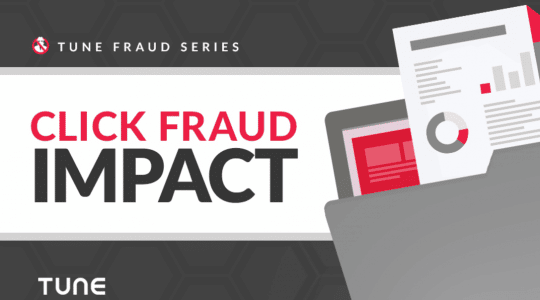2019 Update: HasOffers has rebranded to TUNE! TUNE is the same great technology behind HasOffers, now enhanced with new tools and features for affiliate networks and performance advertisers. Check out our new network features page, compare network pricing plans, or read the rebrand announcement.

HasOffers provides many tools to prevent your network from affiliate fraud, whether it be our own fraud reporting, monitoring, or settings that prevent conversion tracking to be manipulated by affiliates.
1. Fraud score (profile based)
Customize your own fraud criteria to approve new affiliates and monitor affiliate profile fraud. Give weight to the fraud criteria your network finds most important. Fraud Score is a tool that can be used to monitor your affiliates and detect fraudulent affiliate accounts. It allows the network to select fraud criteria that should be monitored and recorded, blocked and flagged. Included with the Fraud score you have the opportunity to receive charts, customized criteria preference settings, threshold percentage ratios, alerts and reports. Read more
2. Fraud score plus (activity based)
You can customize your own fraud settings to monitor affiliate activity, allowing you to give weight to the fraud criteria your network finds most important. Fraud Score Plus is a tool that can be used to monitor and detect fraudulent affiliate activity. It allows the network to set thresholds and rate each criteria for monitoring affiliates activity in real time. The Fraud Score plus system allows you to weigh criteria such as the EPC exceeding set thresholds, maximum daily conversions reached, duplicate IP addresses, and more. Included with the Fraud score plus you will receive charts, customized criteria preference settings, threshold percentage ratios, alerts and reports. You can customize your Fraud Score Plus settings by hovering over the “Company” tab, selecting “Customize Application” and clicking “Affiliate Activity Fraud.” Read more
3. Advertiser security token
This feature allows you to authenticate each conversion with a token string that is unique for the advertiser of the offer. It works very similarly to an API key in authenticating calls. With this enabled, you can expect to have another level of security from any potential fraud by affiliates attempting to force-fire any postback URLs. Read more
4. Offer IP whitelist
In the HasOffers platform, you have the ability to create a “whitelist” for any of your offers so that your offers are limited to certain IP addresses or groups of IP addresses. This forces conversion requests to be validated against a list of IP addresses or referrer domains. You can specify IP addresses to be whitelisted for offers that use postback URLs and domain names for offers that use iFrame or Image pixels. When an IP address is whitelisted, the ad servers check against a list of IPs to make sure the IP is authorized for the offer. If the IP address does not match the approved IPs, the conversion is deemed fraudulent and will be rejected. When a referral domain is whitelisted, the ad servers check to make sure the referring URL to the conversion pixel matches a whitelisted URL. The conversion pixel’s referral domain should be the same URL that hosts the pixel. If the referring URL does not match a whitelisted domain, the conversion is deemed fraudulent and will be rejected. Read more
5. Traffic referrals report
Traffic referrals allow you to view the URL that users are being directed to offers from. The HasOffers application allows you to track referrals for both the tracking link referrals and the conversion pixel referrals, so you can track what page the conversion pixel is being fired from. The HasOffers ad servers pull the referrer URI from the HTTP headers from the tracking link URL (you can read up on referrer URLS in W3C docs). Conversion referral URLs also use the HTTP headers to record the referral URL. Read more
Author
Becky is the Senior Content Marketing Manager at TUNE. Before TUNE, she handled content strategy and marketing communications at several tech startups in the Bay Area. Becky received her bachelor's degree in English from Wake Forest University. After a decade in San Francisco and Seattle, she has returned home to Charleston, SC, where you can find her strolling through Hampton Park with her pup and enjoying the simple things between adventures with friends and family.




Leave a Reply
You must be logged in to post a comment.